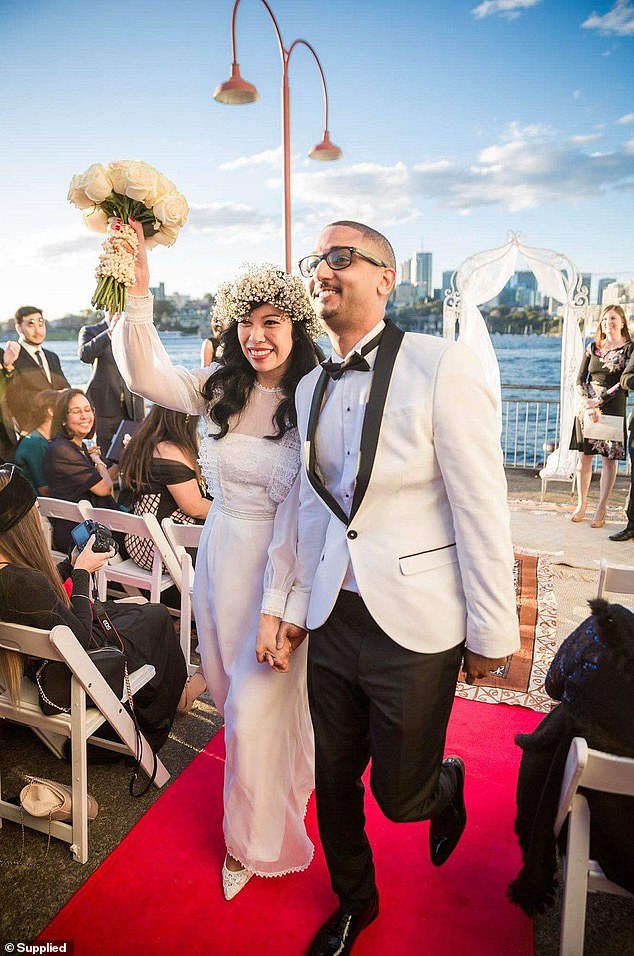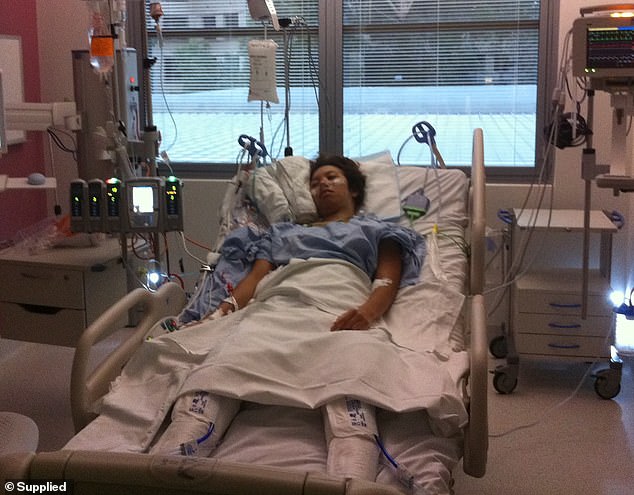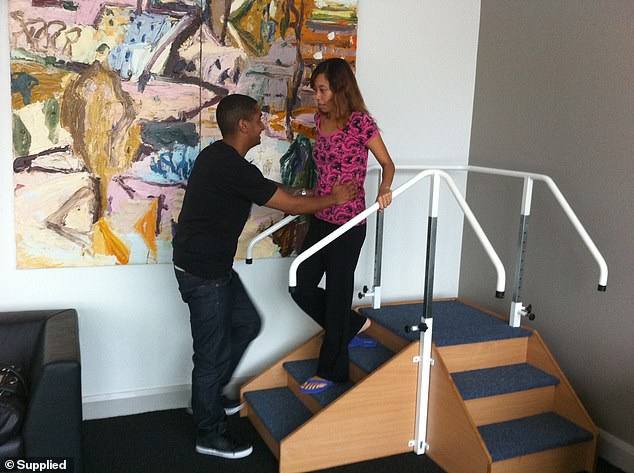Leola Rose should have been feeling lucky to be alive, but instead she was drinking herself to death.
After spending months learning how to walk again after a crippling brain aneurysm, she was going through three bottles of cheap wine a night, topped up with vodka and washed down with a handful of painkillers.
Now 42, Leola tells Daily Mail Australia she was on the brink of losing everything, including her husband when he finally put his foot down.
His ultimatum came after countless nights where Leola, who’d convinced herself she was ‘high-functioning’, had hurt him with unforgivable insults at the nasty end of benders that began with a glass of wine while she worked from home and never really ended.
Leola’s ordeal began at just 28, when an artery in her brain burst while she was in the bathroom at work, and she fell off the toilet unconscious.
A woman in the next cubicle called for help, and when Leola came to she found herself lying on the floor confused, surrounded by paramedics.
‘My eyes were open but I couldn’t speak. I was hearing what people were saying but I couldn’t respond,’ Leola tells us.
She was rushed to Ryde Hospital, in Sydney‘s north, where doctors found massive haemorrhaging in her brain and sent her to Macquarie University Hospital for an emergency operation.


Surgeons attempted to block the burst artery but ended up having to remove part of her skull and clip the blood vessel to stop her bleeding to death.
They saved Leola’s life, but the procedure took a terrible toll.
‘When I woke up in recovery, I couldn’t speak properly and had a really high chipmunk voice for some reason. I couldn’t swallow or walk. I was in intensive care for three weeks and didn’t move,’ she says, revealing she’s still deaf in one ear to this day.
‘The aneurysm itself was like a nuclear bomb had landed on my life. At 28 I was fit, I had bought a house, I had a great boyfriend – my world was complete,’ Leola adds.
‘When the rug is pulled out from beneath you, you don’t know what to do with yourself.’
Learning how to walk again turned out to much harder than she expected, and at times she thought it would be impossible.
‘I thought after 28 years of walking, how hard could it be?’ she recalls.
‘It took me five years to return to full-time work. After rehab, I was only able to work eight hours a week for a minimum of six months. Due to the circumstances, I was let go from my marketing role,’ Leola says.

The devastating job loss was accompanied by anxiety and depression diagnoses, and she was put on medication she’s been taking ever since.
During an appointment with her doctor, she was also told she could never touch alcohol again, which came as a shock because she’s always enjoyed drinking.
And rather than listening to the physician, she rebelled.
‘I thought to myself, “Screw you, I’ll do what I want,”‘ she says.
‘I was always a drinker, which is surprising because my parents don’t drink. I expected to be able to drink how I used to, but that was absolutely not possible after the aneurysm. One drink felt like three drinks.
‘But I kept drinking and thought I would get back to how I was. I would drink myself into oblivion. I blacked out and couldn’t remember what I had done the night before.’
But despite her gruelling road to recovery and spiralling drinking problem, Leola got married and thought life was getting back on track, only to suffer another cruel blow.


In May 2018, she suddenly had a stroke, and doctors found a torn artery in the back of her neck.
‘My world went into a tailspin. I sat there thinking, “Not again. Why is this happening to me?”‘ she recalls.
Leola recovered, but her doctors warned her not to take a trip to Los Angeles she had planned for her birthday because the cabin pressure could cause the artery to rupture again, killing her instantly.
Leola, whose drinking was now dangerously out of control, wanted to take the risk, but her family was horrified.
She fought with her husband and parents over the situation until one night an intense argument turned violent.
‘I was drunk and remember throwing my glass full of whisky at the wall. I threw my phone and we were in a massive fight,’ she says through tears.
‘My mum shouted, “Stop doing this! What are you doing?” over and over before storming out. I screamed for her to get out of my way, and I never speak to my parents like that.’
After another huge fight, her dad told her: ‘Make sure you send me your address so when you die I can tell them where to take the coffin.’

Leola says that in the end she decided to postpone the trip and repair her relationship with her parents, but then the pandemic hit and her drinking habits escalated again when the world was thrown into lockdown.
While working from home she would start drinking in the afternoon and continue into the evening.
A glass of wine was her constant companion on her desk as she worked, on the dining table when eating dinner, and in her hand while unwinding on the couch.
Leola says she would get ‘blackout drunk almost daily’ – washing down 20 prescription pain pills she took for her migraines every three days with copious amounts of alcohol.
She would argue with her husband, slur her words and say things she never meant, and then be unable to remember any of it the next morning.
Her husband would go to sleep at a reasonable hour while she’d stumble into bed at midnight or 1am, and her behaviour began to tear their marriage apart.
It got to a point where Leola’s husband gave her the ultimatum that changed everything: ‘I can’t keep doing this anymore, you’ve gotta make a choice – it’s me or the drinking.’
The next day she walked herself into rehab where she remained for a month – an experience she describes as ‘extraordinarily confronting’.
‘I was in there with ice addicts, heroin addicts and multiple alcoholics. I wasn’t just there with high functioning addicts, like myself, but I was among people who live and breathe drugs and alcohol all day, everyday,’ she says.
‘I never thought I was “one of them” or a “junkie” – whatever you want to call it. Even still, at the end of the day we’re all the same. Regardless of how we appear or behave, we all have the same problem.’

After the first few days the physical alcohol withdrawal symptoms – such as headaches or nausea – passed. But Leola says the overwhelming emotions that followed were even harder to deal with.
‘Addiction is a form of escapism. You do it became you want to escape something. It’s also about secrecy in isolation. I was drinking at home alone which became the problem,’ she says.
She also realised she was haunted by her aneurysm, and believes her drinking was a way of coping with why she had been hit so hard by fate.
After rehab Leola continued to work on herself, only for tragedy to strike again.
In 2022 she fell pregnant but miscarried due to a rare condition in her uterus, and lost another baby again this year.
‘All we want right now is to have a baby,’ she says, and believes her horrendous run of bad luck has made her a stronger and better person.
‘I’m incredibly grateful to be alive. I stopped caring about other people think of me, I stopped trying to live for other people and that mentality serves me really well.’
